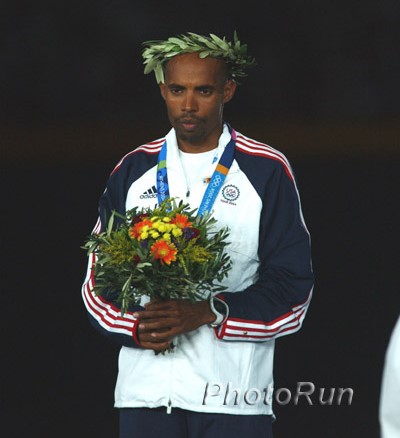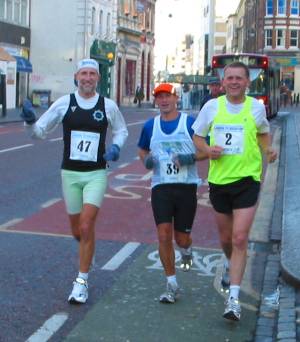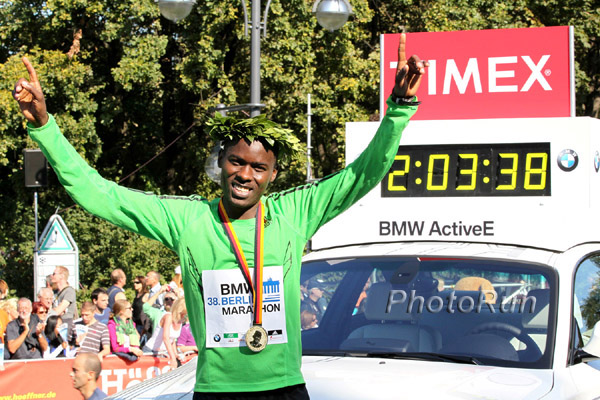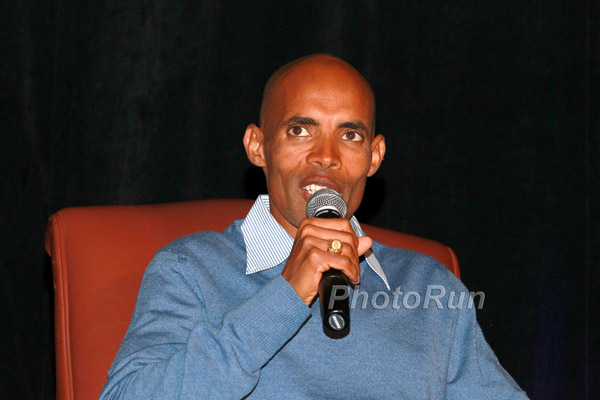One Runner’s Wisdom: An Interview with Roger Low
Roger Low is an American who has lived in London for over 25 years, working in international banking. In a running life that has included competing in every London marathon since the race’s debut in 1981, he has developed a highly distinctive approach to marathon preparation. For Roger, the long run is the key, and that might be an understatement once you have read the interview. He seems barely interested in any race under the marathon, but this approach has produced a lifetime marathon best of 2:33; even today, at age 63, he consistently runs around 3:40. Over 6 feet tall, his physique doesn’t appear to have changed one iota during the past quarter-century, one of many hints (others below) that Roger has been blessed with extraordinary genes.
You’ve told me interesting stories about how you got started, how it went back to what in Europe is called national service in the American military and how that’s where you learned you could run.
Roger Low: As a youngster in school we would run 100-yard races, and I was always the last one, and I had absolutely no interest in running at all, but when I was in the United States Marine Corps we would do long marches during training. I didn’t have any trouble with the marches, but it just got a little boring marching along with everybody else, and so I volunteered to carry the stretchers, which meant I could get out of formation and walk along the side. Sometimes we’d have to stop and pick somebody up who’d fallen out, then catch up with the rest of the people, and I realized I had stamina. I began to run on my own at that time, and when I got out of the Marine Corps I continued. I expanded the length of the runs, maybe started off with three miles and kept on going. I wasn’t thinking about a marathon, but I was doing it for training purposes.
Clearly you knew you had some talent. When did you do your first race?
Roger: After we moved to the U.K., I ran here, again on my own. I think one time in 1980 I was running on my own on Hampstead Heath [Note: a famous, wonderful area of forest and park in north London, which is also home to an athletics stadium and several track and field clubs, including Highgate Harriers] and a bunch of people ran past and invited me to join them, and I’ve been running with them every since. I ran my first marathon in the fall of 1980, and the very first London marathon was in the spring of 1981 and I’ve run every one since then.
The first experience of the London marathon in 1981—did you surprise yourself, and did it give you the feeling that you could run faster?
Roger: Unfortunately I don’t remember all my times in all of my races! But I think I ran my first marathon, in the fall of 1980, in around 3:20, and in the first London I think I was under three hours, and I thought, “Hey, I can do something here.” That was the realization that maybe if I worked at it, I could get reasonable times for a club runner.
When did you run your best time in the London Marathon?
Roger: That was 2:33, probably in 1983 or ’84.
Was that a big training group with Highgate Harriers? I’ve heard stories from you and others of training groups that went up to 100 strong.
Roger: The group that I trained with was doing long runs as you say—100 is maybe an overstatement, but there was a time when marathons were a fad and there were marathons every other weekend. You could also do them for profit, i.e., you could make a couple of hundred pounds or dollars by setting up and organizing a marathon. So in those “faddy” times there could be a lot of people starting out from Parliament Hill on the Heath and some would drop out, well, not drop out, but they’d do a 10-mile run, and others would do a 20-mile run, and we’d do a 30-mile run.
How many of your training mates from those days are still at it?
Roger: The only one in this group who is still running, apart from myself, is David [a member of Highgate Harriers who is the same age as Roger and who has a similar marathon personal best]. He’s still running to keep fit. If Bob [another leading light in Highgate Harriers from the 1980s with similar achievements in the marathon] hadn’t had heart problems which stopped him running, he’d be out with us today. Most of the others had injuries which forced them to stop. I haven’t, and that’s why I’m still running.
How have you stayed motivated to run so much for all these years?
Roger: My motivation is that I eat and drink a lot, and want to keep doing that, and running helps me do it. It’s as simple as that. [Note: Don’t try this at home! See our Nutrition section.] I haven’t had injuries that have prevented me from running, and I’ll carry on doing it. I still have goals, but I run slower these days.
It strikes me you must have pretty good biomechanics to be still doing long runs and running very respectable times in the marathon at your age. Is the long run the basis of everything for you?
Roger: I think it is. There is also an element of luck in [that] my [body] parts have stayed glued on. But I’ve always had the feeling that if I was comfortable in my own mind running beyond 26.2 miles, then the 26.2 miles were going to feel psychologically easy for me. So I have historically done, in the build-up to a marathon at least, long runs beyond 26 miles so that the marathon would seem like a doddle.
When you ran your marathon best, were you doing shorter road races? That’s the orthodox view, isn’t it, doing shorter races to get yourself sharp for the marathon?
Roger: I once did a half marathon; is that a short road race? I felt it wasn’t worth putting a jock strap on unless it were for a race, and a race is 26 miles. [Note: Roger told me his half marathon best was around 1:12, but that was en route to a full marathon! Clearly, his half marathon best in his heyday could have been under 1:10, further indicating impressive ability.]
What about now? Are you still doing the extra-long run in the build-up to this year’s marathon in London?
Roger: Yes, I am. The difference is that a four-hour run [in distance] would have taken me three hours a few years back. The same run.
What’s your routine like? I’ve talked with others who are mature runners, such as ourselves, and some are running fewer sessions than 25 years ago, others still as many and others are incorporating different types of training. How does your current training look?
Roger: It’s more difficult and I’m more tired afterwards, but I try to do what I was doing before. I have an unusual weekly plan. I ride a motorcycle, so I ride my motorcycle in to work on Monday morning and I run home on Monday night. I run in on Tuesday morning and ride my motorcycle home in the evening, etc. [Note: This run takes him on average 1:20 minutes if he does the full distance of 10 miles. Sometimes, if leaving behind schedule in the morning, he’ll cut the run to eight miles. A rough calculation suggests that he should be getting around 50 miles from this weekday running, before the long effort on Sunday.] So I try to run each day of the week. Saturdays I have historically taken off, not because I felt I needed to but because I had other things to do. Sunday, you and I and others go for a long run and the difference is that, as I said, I’m doing the same distance but it’s taking me longer and when I come back, instead of going into the garden and starting to dig or do something, it’s nice to have a nap!
I think we all can enjoy having a nap. Especially for someone who is not a runner, the idea of a marathon is daunting. Have you felt that you’ve been mentally strong, from those days in the U.S. Marine Corps onwards? Have you felt that mental strength has been a factor in running 2:33 and also keeping running now?
Roger: I think it must be important. Just the thing like it’s been a little chilly the last few days in London and you have to be mentally strong to say, “I’m going to put my running gear on and go out and run 8, 9 or 10 miles.” That’s the hard part. Once you’ve got your gear on and stepped out the door, it’s almost easy.
Thinking of this unbroken streak in the London marathon since 1981, what’s the plan? Do you intend to run London for as long as you can?
Roger: I think so. I think I’ll probably run until my bits fall off or it gets so slow that I feel I’m no longer running any more and I think, “Why bother?”
You ran not so long ago the Abingdon Marathon in Oxfordshire, just outside London, and you ran around 3:40. Is it the case that you’d be happy with that kind of time or 4:00, but you wouldn’t want to be running a 5:00 marathon?
Roger: Maybe I’ll be adjusting my sights. Right now it may make sense to say, “Well, if I can’t run under 4:00 I might give up,” but I may adjust and say, “If I can’t run 5:00 or even 6:00.” There are some very impressive times being run by people in their 70s and 80s—I’m 63—and there may always be people against whom you can compete.
The competitive edge does slip. One has finally “got a life.” The competition is less with other runners and more with oneself, not to slip too far behind the time of the last race and, hopefully, to better it—to focus on times relative to one’s age peers, not on the young club runners. And to remember that one is still beating a great percentage of the field in any given race, no matter their ages.
Have you focused more on nutrition as you’ve aged? Not so much in terms of maintaining weight, but for health reasons and as an aid to speeding recovery from training.
Roger: I don’t eat eggs, and have followed a low-cholesterol diet for 20 years. My wife doesn’t use butter for cooking, but that’s about it.
Do you try to convince sedentary people of your age of the benefits of fitness? What do they think about your devotion to running?
Roger: Nothing out of the ordinary. As for work colleagues, they know I’m a runner because they see me in my sweaty running gear, arriving at work. But it’s not obvious that anyone has taken up running or doing marathons just because they see me do it.
What about any of your younger relatives?
Roger: The only person who perhaps has been influenced is my daughter. She is now 31, and has started running, not competitively, but for fitness. However, she has always been pretty active, doing a variety of sports and outdoor pursuits.
Your father recently celebrated a big birthday; he turned 90. Do you think, “There are many years left in me?”
Roger: My father was not a sportsman, but in his latter years he has taken up going to the gym and running on the treadmill. He complains to me that at the age of 90, he’s getting fewer miles for the same amount of time he spends on the treadmill, and I say to him, “Dad, I’m a lot younger than you are, and I’m having the same problem.”
- Posted March 27, 2007
© Copyright 2007-2022 by Take The Magic Step®. All Rights Reserved.




